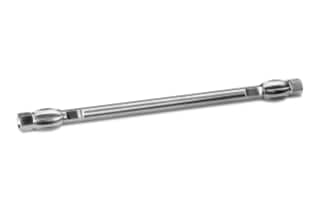
|
Chemistry |
C8 |
|
Separation Mode |
Reversed Phase |
|
Particle Substrate |
Hybrid |
|
pH Range Min |
2 pH |
|
pH Range Max |
12 pH |
|
Maximum Pressure |
6000 psi (415 Bar) |
|
Endcapped |
Yes |
|
Bonding Technology |
Shield RP8 |
|
Silanol Activity |
Low |
|
Particle Shape |
Spherical |
|
Particle Size |
5 µm |
|
Endfitting Type |
Waters |
|
Pore Size |
125 Å |
|
Format |
Column |
|
Surface Area |
175 |
|
System |
HPLC |
|
USP Classification |
L7 |
|
Inner Diameter |
3.9 mm |
|
Length |
150 mm |
|
Carbon Load |
14 % |
|
UNSPSC |
41115709 |
|
Brand |
XTerra |
|
Product Type |
Columns |
|
Units per Package |
1 pk |

XTerra Shield RP8 Column, 125Å, 5 µm, 3.9 mm X 150 mm, 1/pk
Waters' patented embedded polar group technology is used in XTerra Shield RP8 columns, which are general-purpose, hybrid-based, reversed-phase C8 columns. When compared to a silica-based column, these first-generation columns provide superior pH stability. Waters' proprietary organic/inorganic hybrid particle technology (HPT) was developed specifically to address the hydrolytic instability of conventional silica columns at high pH.
The XTerra substance is made from the condensation of two high-purity monomers rather than one, which is a significant difference. In order to create the XTerra column, TEOS and methyltriethoxysilane are used in the hybrid particle synthesis process (MTEOS).
The analytical column is produced in the Waters chromatography chemistry manufacturing plant under the most stringent cGMP, ISO 9002 conditions. Silica-based and polymeric chromatography materials are synthesized and packed into columns and solid-phase extraction devices at the manufacturing plant. This ensures that you get high-quality lab equipment that produces consistent and reliable results. When you buy the Bondapak C18 Radial-Pak Column, you get the most important performance features: column efficiency, peak symmetry, column lifetime, and column-to-column reproducibility.
The XTerra Shield RP8 Column is operational within a pH range of 2 to 12, up to a maximum pressure of 6000 psi (or 415 Bar), and a Carbon Load of 14%. You will be able to shop for lab equipment based on your laboratory needs, as well as connect with a member of our global support staff who can assist you with any questions or concerns you may have.
You may also be interested in XTerra Shield RP8 VanGuard Cartridge, 125Å, 5 µm, 3.9 mm X 5 mm, 3/pk; XTerra Shield RP8 VanGuard Cartridges are used to extend the lifetime and performance of analytical columns by removing particulate contamination from the mobile phase stream. This cartridge has been designed to protect all 3.9 mm and 4.6 mm I.D. XTerra Shield RP8 analytical columns with 5 m sorbent particles.
How Much Time Does It Take To Change A Column?
In HPLC, column changes are a viable method development tool, and columns can be switched as needed. To avoid leaving air in the column entrance, attach the new column with a slow flow of solvent from the injector outlet line to fill the inlet fitting of your column. Before injecting a sample, we recommend flushing a column with at least six columns of a new solvent to re-equilibrate the column. Plan on ignoring the first injection because the second, third, and subsequent injections are usually repeatable.